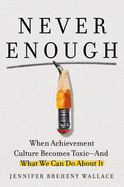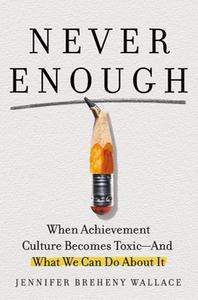
 Even before the onset of the Covid-19 pandemic, it was clear American teenagers were facing a mental health crisis, one that manifested itself in alarming rises in the rates of depression, anxiety, and other psychological ailments. In Never Enough, Jennifer Breheny Wallace, a journalist and mother of three adolescent children, identifies the root cause in an "environment of unrelenting pressure" created by the single-minded pursuit of achievement and status. While sympathetically exploring the dimensions of the problem, she also offers some thoughtful approaches to parenting intended to create a more humane, and sane, culture for young people.
Even before the onset of the Covid-19 pandemic, it was clear American teenagers were facing a mental health crisis, one that manifested itself in alarming rises in the rates of depression, anxiety, and other psychological ailments. In Never Enough, Jennifer Breheny Wallace, a journalist and mother of three adolescent children, identifies the root cause in an "environment of unrelenting pressure" created by the single-minded pursuit of achievement and status. While sympathetically exploring the dimensions of the problem, she also offers some thoughtful approaches to parenting intended to create a more humane, and sane, culture for young people.
Wallace's analysis is rooted in a survey she conducted in early 2020 with the assistance of a researcher from the Harvard Graduate School of Education. More than 6,000 parents quickly responded, offering tangible support for the published reports on the dire state of adolescent mental health.
To aid in interpreting and explaining the results, Wallace traveled across the United States--from Wilton, Conn., to Mercer Island, Wash.--where she engaged in thoughtful conversations with some 200 of her respondents, most of them well-educated people living in affluent communities who were open about sharing the challenges they face as parents and children living in a "kind of gilded pressure cooker." She skillfully weaves these stories, by turns inspiring and painful, into her narrative, acknowledging that some conversations led her and her husband to make changes in their own parenting practices.
Wallace's fundamental prescription, one she describes as a "radical new lens for how we as adults... see our kids and communicate to them about their worth, potential, and value to society," is a concept she calls "mattering," shorthand for "the feeling that we are valued and add value to others." Instead of prizing children only for the achievements that will pave the way for entry into elite colleges and high-status jobs, she argues, mattering can serve to "correct the lies that our society tells them: that they only matter if they're performing, if they're achieving. Our job is to let them know they are enough, right now, in this moment."
Wallace offers various practical steps for beginning to realize this vision in daily life, ones she supports with citations to relevant research. They include assigning children age-appropriate chores to foster an outward focus, and creating parenting networks to ease the feeling of isolation that arises when parents feel they're grappling with problems particular to their offspring. Through these and other practices, she writes, we can shift from an attitude of scarcity and competition to one of abundance and connectedness.
It will take cooperation among parents, educators, and policymakers to address this crisis before the damage to a generation of children becomes too profound and lasting. Wallace's book is a useful starting point for those committed to that task. --Harvey Freedenberg, freelance reviewer
Shelf Talker: By valuing children for who they are rather than what they do, Jennifer Breheny Wallace argues, we can begin to alleviate some of the serious mental health problems afflicting American children.

